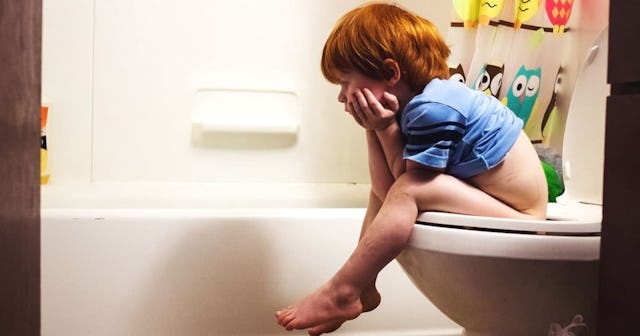Pandemic Poops Are A Thing

Let’s talk about poop. It’s something we all do (every day, if we’re lucky) and most of us have no idea how much our poop is talking to us — we usually just pinch one off and go about our day without thinking about it. But our digestive tracts react to stress, anxiety, and changes in our eating habits.
Many of us aren’t going to poll our friends about it on Facebook, but chances are you’ve gone through a few different poop stages since the outbreak of COVID-19, and you might be wondering why. You may be thinking you just have more time to ponder your poop — but chances are, the stress, anxiety, and change in routine is all having an effect on your bowels.
My kids and I aren’t shy when it comes to talking about our bathroom habits, and now that we’re together 24/7 and literally don’t poop anywhere else, it’s become a topic of conversation. The first week of quarantine, one of my kids and I had diarrhea. We both felt fine otherwise. Theirs was likely due to a steady diet of microwave burritos and ramen, while mine was probably from stress. My blowouts would remind me of what happens to my body before I get ready to run a race: It’s almost as if it knows it needs to unload it all because I’m nervous and anxious and my poo just doesn’t want to coexist with me anymore.
The next week I was constipated, and one of my kiddos whispered to me they hadn’t gone in three days which wasn’t their norm. I realized we’d been on a soda binge, not drinking enough water, and not really moving much at all.
As it turns out, my household isn’t the only one going through different poop phases. Pandemic poops are a thing, and there are a few reasons behind why you may be constipated or having diarrhea.
Scary Mommy spoke with Heather Jeffcoat, DPT, who specializes in treating pelvic health conditions. She told us you may be having trouble going number two because, “In times of stress, you get an upregulation of the nervous system, which is like a fight or flight response, much like what your body is going through when it is being chased by a tiger.”
So basically, the last thing your body is going to do is sit down and have a nice, comfortable bowel movement. Dr. Jeffcoat adds,”If your body is not working in a downregulated fashion, which is required for normal bowel movements (also known as ‘rest and digest’) your body is fighting you and bowel movements will be unsuccessful.”
If you’ve been blocked up for more than a few days, have abdominal pain, or there is blood in your stool, Jeffcoat says you should call your doctor. However, there are things you can do right now to get your bowels moving in the right direction:
Staying hydrated in the most important thing we should all be doing. Dr. Jeffcoat says, “A minimum of sixty-four ounces of water a day, but more in hot and humid environments.”
If you are suffering from constipation, Dr. Jeffcoat explains how to give yourself a helpful “ILU” massage: “Start on your lower right side and gently massage in small circles and then long strokes up the ascending colon (this makes the I). From there, you continue on around the bend and do the same technique along the transverse colon, which runs under your rib cage area (creating an L), and finally work your descending colon in this same fashion down towards your lower left abdomen towards your rectum.”
Jeffcoat recommends you give yourself this massage for about 10 minutes, twice a day to get things moving along.
If you are on the other end of the spectrum and are having diarrhea, Dr. Kim Langdon, M.D. explains that the gut and brain are linked by the autonomic nervous system. “When we are stressed, anxious, or going through a long period of isolation, our brains release more serotonin and epinephrine (adrenaline), which trigger the release of cortisol from the adrenal glands,” she told Scary Mommy via email.
When serotonin levels rise, our gut reacts by having spasms, which lead to diarrhea or constipation depending on where the stool is in the process of digestion, Dr. Langdon stated.
During this time of isolation, she says, constipation is probably more likely because our decrease in physical activity can slow down our gastrointestinal transmit times “allowing more water to be reabsorbed into the stool — less water makes the stool harder and more difficult to pass.”
Dr. Langdon says the best thing we can be doing for our digestive health during isolation is try to get at least thirty minutes of activity a day, drink lots of water, and check fiber intake to ensure we are eating as many fresh fruits and veggies as we can right now.
So, if you’ve been wondering why you can’t go or are having diarrhea, unfortunately it’s probably another side effect from this pandemic. And we can only hope when things start to go back to normal and our anxiety begins to melt away a bit, our poop will follow suit.
This article was originally published on